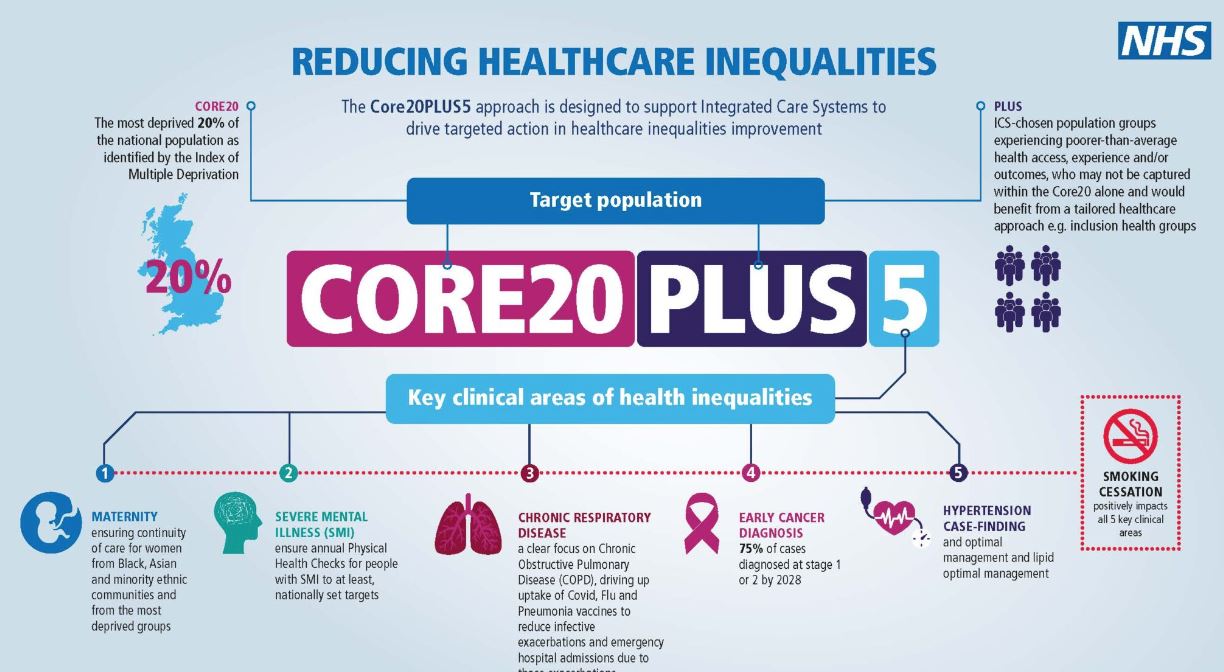Innovation for Healthcare Inequalities Programme (InHIP)
The Innovation for Healthcare Inequalities Programme (InHIP) aims to address local healthcare inequalities experienced by deprived and other under-served populations. This is a national programme and in the North East and North Cumbria region, our programme centres on cardiovascular disease prevention.
Programme Overview
The programme is a unique collaboration between the Accelerated Access Collaborative (AAC), NHS England’s National Healthcare Inequalities Improvement Programme and England’s 15 Health Innovation Networks (HINs) and delivered in partnership with Integrated Care Systems (ICSs).
Health inequalities are unfair and avoidable differences in health across the population, and between different groups within society. These include how long people are likely to live, the health conditions they may experience and the care that is available to them.
Some groups in society – particularly the socially excluded, those living in areas of high deprivation, and those from Black, Asian and minority ethnic communities – can experience extreme differences, especially people who are in more than one of these seldom listened-to groups
The programme focuses on five clinical areas of priority which closely align with the national Core20PLUS5 approach to reducing healthcare inequalities at both national and system level. The five priority areas are:
- Maternity
- Mental Health
- Respiratory
- Cancer diagnosis
- Cardiovascular disease

Source: NHS England
Activity in the North East and North Cumbria Region
The North East and North Cumbria region has the lowest healthy life expectancy and highest health inequalities in England with Middlesbrough having one of the lowest life expectancies in England. In terms of Cardiovascular Disease (CVD), Middlesbrough has the highest mortality rate in the North East and is the 11th highest nationally.
The InHIP programme in the NENC region focuses on addressing health inequalities in the context of CVD in the Middlesbrough area. The core element of the Middlesbrough CVD InHIP project is to run a series of seven behavioural insight focus groups with minority and marginalised communities, to understand their experiences of and barriers to accessing CVD health checks. The views of local communities are key to this work. Insight into their experiences will help co-design sustainable and effective CVD prevention interventions in Middlesbrough aimed at reducing avoidable premature CVD deaths and narrowing health inequalities within the local population.
Key partners include:
- NHS England
- Health Innovation Network National InHIP Team
- ICS NENC Team
- NHSE NEY Regional Team
- Middlesbrough Locality (Middlesbrough Council, Community Leaders, BAME network)
- NIHR Applied Research Collaborative, NENC
There will be important learnings from this novel approach regarding improving access to CVD risk assessments and the delivery of services. We will share these learnings with the communities involved and beyond to enhance engagement and to facilitate further adoption and spread in CVD but also in other conditions that are seen frequently in CORE20PLUS5 populations.
Summary Findings: A Co-Designed Approach to Cardiovascular Disease Prevention in Middlesbrough
The InHIP project in Middlesbrough has gathered behavioural insights from targeted Core20Plus5 population, to understand the barriers and challenges they face when accessing heart health checks locally, through focus group interviews.
These communities were also consulted on how best they would want to address these service access challenges. In this video, Dr Joe Chidanyika, CVD Programme Manager for Health Innovation North East and North Cumbria (HI NENC), leads a follow-up with community leaders, who enabled access to the focus groups, discussing how the study findings can now be co-designed into tangible pilot interventions, to increase heart health checks for Black-Africans, South Asians and the indigenous underserved white population groups in Middlesbrough.
For further information, please contact either Joe Chidanyika or Karen Verrill

